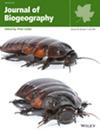Primary forests harbour more bird taxonomic, phylogenetic and functional diversity than secondary and plantation forests in the pantropics
Abstract
Aims
Primary forests provide critical habitat and diverse ecological niches for bird species, which are being seriously threatened by massive anthropogenic activities in the Anthropocene. Conversion from primary forests to secondary forests and plantation forests results in biodiversity loss, reducing ecosystem functioning and services. However, few studies have evaluated bird diversity patterns in different forest types caused by anthropogenic activities at both pantropics and regional scales, especially from taxonomic, phylogenetic and functional perspective simultaneously, as well as from the perspective of both alpha and beta diversity.
Location
Pantropics.
Methods
We analysed patterns of bird diversity in primary forests, secondary forests and plantation forests at pantropics and regional scales. Number of threatened species, rare species, and generalist species in the three forest types were summarized. Taxonomic, phylogenetic and functional diversity, as well as phylogenetic and functional structure of bird communities among the three forest types, were evaluated through multiple comparisons. Beta diversity of bird communities in the three forest types was also calculated and decomposed into turnover and nestedness-resultant components, and correlations between environmental factors and beta diversity were examined.
Results
The results showed that primary forests harboured more threatened species, more large species and specialist species than secondary forests and plantation forests. In addition, plantation forests had lower phylogenetic alpha diversity but higher functional alpha diversity, and had more clustered phylogenetic structure but more over-dispersed functional structure. Notably, taxonomic, phylogenetic and functional beta diversity of bird communities was significantly higher in primary forests than in plantation forests, and turnover components showed similar patterns and accounted for major parts of overall beta diversity.
Main Conclusions
These findings suggest that primary forests play an important role in protecting bird taxonomic, phylogenetic and functional diversity, and emphasize that future conservation efforts should focus on the strict protection of primary forests.

 求助内容:
求助内容: 应助结果提醒方式:
应助结果提醒方式:


